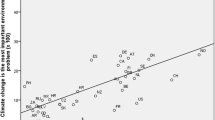Abstract
It has been shown previously that the awareness and concern of the general public about global warming is not only a function of scientific information. Both psychological and sociological factors affect the willingness of laypeople to acknowledge the reality of global warming, and to support climate policies of their home countries. In this paper, I analyse a cross-national dataset of public concern about global warming, utilising data from 46 countries. Based on earlier results at the national and regional level, I expect concern to be negatively correlated to national measures of wealth and carbon dioxide emissions. I find that gross domestic product is indeed negatively correlated to the proportion of a population that regards global warming as a serious problem. There is also a marginally significant tendency that nations’ per capita carbon dioxide emissions are negatively correlated to public concern. These findings suggest that the willingness of a nation to contribute to reductions in greenhouse gas emissions decreases with its share of these emissions. This is in accordance with psychological findings, but poses a problem for political decision-makers. When communicating with the public, scientists ought to be aware of their responsibility to use a language that is understood by laypeople.
Similar content being viewed by others
References
ACNielsen (2007) Global warming: a self-inflicted, very serious problem, according to more than half the world’s online population. http://www2.acnielsen.com/news/20070129.shtml. Accessed 12 February 2007
Akaike H (1973) Information theory and an extension of the maximum likelihood principle. Int Symp Inf Theory 2:267–281
Brechin SR (1999) Objective problems, subjective values, and global environmentalism: evaluating the postmaterialist argument and challenging a new explanation. Soc Sci Q 80:793–809
Brechin SR (2003) Comparative public opinion and knowledge on global climatic change and the Kyoto Protocol: the U.S. versus the world. Int J Sociol Soc Policy 23:106–134
Burnham KP, Anderson DR (2002) Model selection and multimodel inference: a practical information-theoretic approach, 2nd edn. Springer, New York
Corbett JB, Durfee JL (2004) Testing public (un)certainty of science. Sci Commun 26:129–151
Dunlap RE (1998) Lay perceptions of global risk: public views of global warming in cross-national context. Int Sociol 13:473–498
Dunlap RE, Mertig AG (1995) Global concern for the environment: is affluence a prerequisite? J Soc Issues 51:121–137
Dunwoody S (2007) The challenge of trying to make a difference using media messages. In: Moser SC, Dilling L (eds) Creating a climate for change: communicating climate change and facilitating social change. Cambridge University Press, Cambridge, pp 89–104
Hardin G (1968) The tragedy of the commons. Science 162:1243–1248
Hersch J, Viscusi WK (2006) The generational divide in support for environmental policies: European evidence. Clim Change 77:121–136
IMF (2006) World Economic Outlook Database. http://www.imf.org/external/pubs/ft/weo/2006/02/data/index.aspx. Accessed 12 February 2007
IMF (2007) World Economic Outlook Database. http://www.imf.org/external/pubs/ft/weo/2007/01/data/groups.htm. Accessed 18 December 2007
Int J Psychol (1991) The psychology of global environmental change. Int J Psychol 26(5):547–673
Int Sociol (1998) Climate change and society. Int Sociol 13(4):421–516
Krosnick JA, Holbrook AL, Lowe L, Visser PS (2006) The origins and consequences of democratic citizens’ policy agendas: a study of popular concern about global warming. Clim Change 77:7–43
Leiserowitz A (2005) American risk perception: is climate change dangerous? Risk Anal 25:1433–1442
Leiserowitz A (2006) Climate change risk perception and policy preferences: the role of affect, imagery, and values. Clim Change 77:45–72
Leiserowitz A (2007) Communicating the risks of global warming: American risk perceptions, affective images, and interpretive communities. In: Moser SC, Dilling L (eds) Creating a climate for change: communicating climate change and facilitating social change. Cambridge University Press, Cambridge, pp 44–63
Lorenzoni I, Pidgeon NF (2006) Public views on climate change: European and USA perspectives. Clim Change 77:73–95
Mahlman JD (1998) Science and nonscience concerning human-caused climate warming. Annu Rev Energy Environ 23:83–106
Marland G, Boden TA, Andres RJ (2006) Global, regional, and national fossil fuel CO2 emissions. In: Carbon Dioxide Information Analysis Center (ed) Trends: a compendium of data on global change. Oak Ridge National Laboratory, Oak Ridge. http://cdiac.esd.ornl.gov/trends/emis/meth_reg.htm. Accessed 12 February 2007
McCright AM (2007) Dealing with climate change contrarians. In: Moser SC, Dilling L (eds) Creating a climate for change: communicating climate change and facilitating social change. Cambridge University Press, Cambridge, pp 200–212
Moser SC (2007) More bad news: the risk of neglecting emotional responses to climate change information. In: Moser SC, Dilling L (eds) Creating a climate for change: communicating climate change and facilitating social change. Cambridge University Press, Cambridge, pp 64–80
Moser SC, Dilling L (eds) (2007) Creating a climate for change: communicating climate change and facilitating social change. Cambridge University Press, Cambridge
Norgaard KM (2006) “We don’t really want to know”: environmental justice and socially organized denial of global warming in Norway. Organ Environ 19:347–370
O’Connor RE, Bord RJ, Yarnal B, Wiefek N (2002) Who wants to reduce greenhouse gas emissions? Soc Sci Q 83:1–17
Oppenheimer M, Todorov A (2006a) Guest editorial. Clim Change 77:1–6
Oppenheimer M, Todorov A (eds) (2006b) Global warming: the psychology of long-term risk. Clim Change 77(1/2):1–210
R Development Core Team (2005) R: a language and environment for statistical computing, version 2.1.1. R Foundation for Statistical Computing, Wien
Risk Anal (2005) Special issue on defining dangerous climate change. Risk Anal 25:1387–1509
Sugiura N (1978) Further analysis of the data by Akaike’s information criterion and the finite corrections. Commun Stat A 7:13–26
UNDP (2007) 2007/2008 Human Development Index rankings. http://hdr.undp.org/en/statistics/. Accessed 18 December 2007
World Bank (2006) World Development Indicators 2005. http://siteresources.worldbank.org/DATASTATISTICS/Resources/table4–1.pdf. Accessed 12 February 2007
Zahran S, Brody SD, Grover H, Vedlitz A (2006) Climate change vulnerability and policy support. Soc Nat Resour 19:771–789
Zahran S, Kim E, Chen X, Lubell M (2007) Ecological development and global climate change: a cross-national study of Kyoto Protocol ratification. Soc Nat Resour 20:37–55
Author information
Authors and Affiliations
Corresponding author
Rights and permissions
About this article
Cite this article
Sandvik, H. Public concern over global warming correlates negatively with national wealth. Climatic Change 90, 333–341 (2008). https://doi.org/10.1007/s10584-008-9429-6
Received:
Accepted:
Published:
Issue Date:
DOI: https://doi.org/10.1007/s10584-008-9429-6




